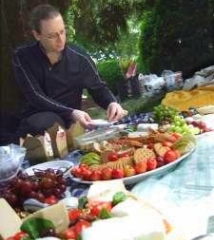I have never wanted for money. This is not to say that I haven’t been poor. [Social activist friends: please note that I am fully aware that even as a very poor American I would live far beyond the standard of living of most of the rest of the world. It is not lost on me that I’ve never truly known poverty.] I have been very poor, my family having had to live with my maternal grandparents for a short time when I was very young, living for a year on strange negotiations and about two thousand dollars in my late teens, eking out a livable though low-key existence on eighteen thousand a year in arts management when I was wrapping up college. Until recently, money has always been a terminal limitation on whether I had control over my life. And my valuation of money has changed across that span.
Even when things have been tight, I made good budgets and reasonable plans. I was able to graduate from college without debt (and then art school with a minor and manageable short-term debt). I was able to afford several bargain trips to Europe. I kept my expectations low, my obligations negligible, and my expenses minimal. I learned to be DIY wherever possible and to like it. My simple living and good planning let me take a lot of risks that I otherwise would not have been able to make. Fools Play afforded me a free education in business. The dotcom crash gave me a lasting object lesson [initial Freudian typo: lesion] in investment. I learned to manage risk and calculate the return on my aggressive investment.
Unchecked risk makes my skin crawl. Educated risk though, has been pretty easy – not painless, but easy – for me with my few obligations, unburdened by debt. I have taken carefully considered risks that have been sometimes expensive in the short term but always high-yielding in the long run for me. Risks that have wildly expanded my experience, broadened my skill set in surprising directions, raised my expectations around what is possible, and doubled my income every three years on the average.
I assume that there is a boundary somewhere around improving experience and skills, though I’ve not found it (and I’m not particularly worried that I’m about to run up against that barrier anytime soon). I seem to find it plenty easy to ratchet up my expectations as I come near meeting them so that I’m always hungry and a little uncomfortable. But in any realistic terms, I’m going to hit a ceiling within two years inside of the tech sector that will slow my income doubling trend by a factor of three. The next doubling will be the last for a decade or more… as an employee, that is. As someone with ownership, the rules change. The risk factor goes up but the rewards can be scalar as well.
Money isn’t zero sum. In a world where ideas can translate into resources, there is always room to generate new money where there was none before. All the same, I am underwhelmingly happy on ethical grounds about presiding over a steadily growing nest egg. Without skin in the game, it is arguable that this is in practical terms all I am doing right now. There can be a fine line between saving and hoarding, and it’s well established* that hoarding has a poisonous effect on the world around the hoarder, both directly and indirectly. If I can generate strong revenue and therefore (presumably) much higher incomes, I can continue accelerating fiscal control over my life and help others to achieve the same sort of result. That definitely helps convince me that I’m no partner to hoarding and that this is the right direction to go.
* Look at me not citing this “well established” fact. Feel free to challenge me if my unsupported proclamation is insufficiently convincing and I’ll spend the time to go fetch the research.
16 September 2007
Subscribe to:
Post Comments (Atom)


No comments:
Post a Comment